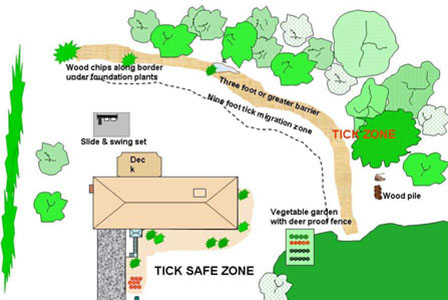These techniques should be considered for making your home as free of ticks as possible.

Practice Tick-Safe Landscaping
The ticks that transmit Lyme Disease (Ixodes ticks) need the higher humidity levels of the woodland to survive; they die quickly in drier environments. Increasing exposure to sun and air by removing leaf litter, mowing the lawn and clearing tall grass and brush around houses and at the edges of lawns will reduce the numbers of ticks that transmit Lyme disease. Laying down wood chips or gravel where lawns butt up against wooded areas can reduce the number of ticks on grassy areas by creating a drying barrier.
Use Chemical Control
The use of pesticides to control tick populations is another highly effective option. Pesticide application to residential properties should be supervised by a licensed professional pest control expert and should be conducted when nymphal Ixodes populations are at their local peaks.
Permethrin is an insecticide that is effective in both killing and repelling ticks in your yard. The best time to apply permethrin to your yard for ticks in Fairfax County is between late March and early May. Contact a professional pesticide company to apply pesticides at your home.
Discourage Deer
A relationship exists between the abundance of deer and the abundance of Ixodes ticks in the community. Tick populations do not decrease substantially unless deer are eradicated or considerably reduced. Constructing physical barriers and removing food, such as spilled bird seed, from your yard will discourage deer from entering your yard. In addition, removing plants that attract deer and constructing physical barriers may help discourage tick-infested deer from coming near homes. Lists of deer-resistant plantings are available from garden centers, nurseries or local extension agents.
Find out more about deer management in Fairfax County.
Resources
- Ticks and Tick Bite Prevention
- National Pesticide Information Center
- Environmental Protection Agency
- Centers for Disease Control and Prevention
- Tick Management Handbook - Connecticut Agricultural Experiment Station

